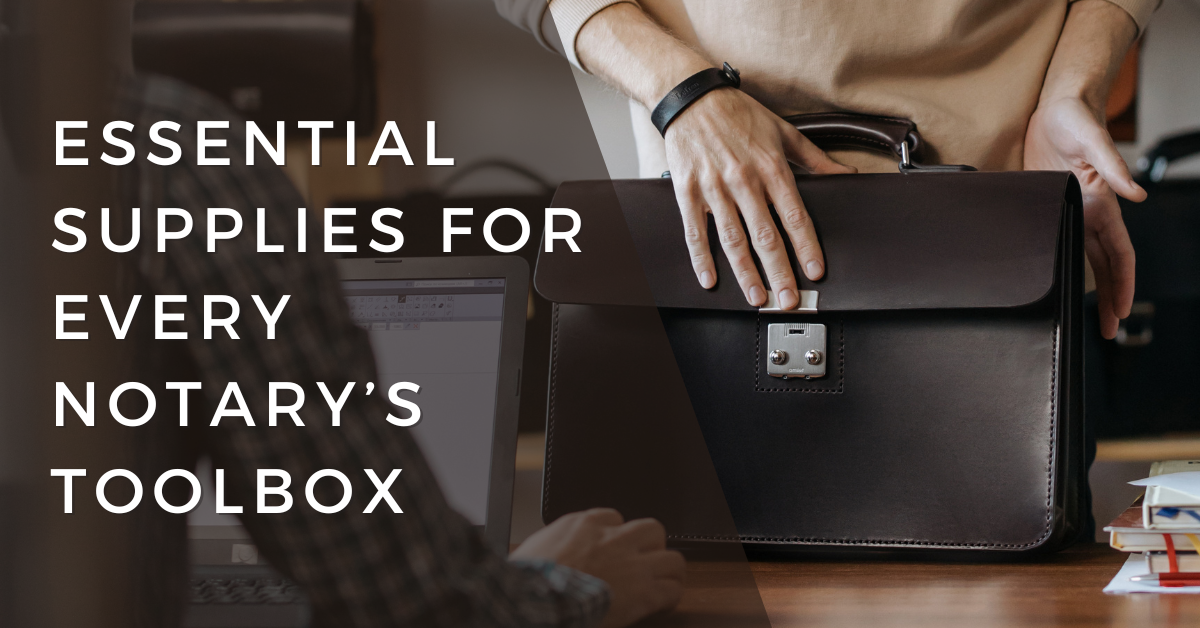Florida Notary Public Updates
Essential Supplies for Every Notary’s Toolbox

Notaries who work full-time performing notarizations for the general public, or employee notaries who also notarize after work hours, earn their money by being ever-ready to meet customers where they are.
If you are one of those hardworking notaries, you know to be prepared for any and every possible need, especially when you travel to customers’ homes or to suitable public places to perform the desired notarization(s).
Simply forgetting a must-have item—for example your notary stamp or seal—will prevent you from notarizing. You will also send the wrong message about your skills and reliability. You’ll also have to hope that the client will reschedule with you instead of immediately seeking out another available notary.
Don’t risk losing appointments because you forgot something that’s essential to performing notarizations. Instead, create and maintain a well-stocked notary “toolbox” that goes everywhere with you, and is always on-hand for every notarization you perform.
- The foundation… a rolling briefcase.
For optimal portability, your notary toolbox needs wheels and a telescopic handle. It also should be lockable. Test the case’s telescopic handle for sturdiness, whether it moves easily into the position that you want, and if it can be locked into your preferred position. Roll the case to test how smooth the wheels feel, and how well the case handles bumps. Note how heavy the case feels when you lift it, then imagine how much heavier it will be once it’s full. Find a lighter case if you’re at all uncomfortable with the weight of an empty one—repetitive use of a too-heavy case can injure you over time. Finally, choose a case that’s either hard-side, or one with tough, water-resistant fabric that can handle rainy days. (Tip: a hard-side case can provide a writing surface in a pinch.)
- Add office-supply essentials.
Stock your rolling briefcase with the supplies you need to perform a notarization and any clerical tasks. These include:
- Notary stamp/seal.
- Journal (also called a record book) for recording the facts of every notarial act you perform.
- Ink pens; these should be the permanent-ink type, in colors that reproduce well (black or dark blue are good, red is not). Check your state’s requirements, if any, on use of certain ink colors.
- Blank notarial certificates for the most common acts (acknowledgment, verification on oath or affirmation/jurat) and for other less common acts that your state might authorize (for example copy certifications, or certification of a fact or occurrence).
- A clipboard (for those times you don’t have access to a desk or tabletop).
- Fingerprint ink pad, if your state requires a finger- or thumbprint in your journal (record book) entry.
- A list of the fees that your state law allows a notary to charge for each notarial act. If your state requires posting of fees or providing a fee list to every customer, carry enough copies of your list to help you meet your state’s requirements.
- Business cards.
- Other office supplies like a small stapler and extra staples; paper clips; binder clips; Post-It-Notes; extra ink for your notary stamp.
- Envelopes in various sizes, plus stamps.
Note: never use correction fluid or tape to cover mistakes or to edit anything in a document or documents involving a notarial act. Be knowledgeable about applicable state laws. For example, in Florida a notary may not change anything in a document after it has been signed by anyone, nor may they amend a notarial certificate after the notarization is completed.
Your final must-have item isn’t part of your notary kit as much as it is your lifeline: your cell phone, plus charging cables and plugs, plus a portable charger. It’s smart to own more than one portable charger, as this item itself will require regular charging. Become skilled at using certain indispensable applications, such as your map app.
- Important Extras
Notaries performing work for the general public should be prepared to identify themselves to their customers. A state-issued card such as a driver license is most often used for this purpose.
Notaries should also know how to show evidence of their active notary commission. Depending on your state, this evidence might be a link to your active listing on your state commissioning officer’s website; paper or electronic copies of your commission or appointment certificate; an official (commissioning officer-issued) notary commission card; etc.
If you’re not already practicing at least some of these recommendations, take the time now to implement them. They will help keep you prepared, polished and ready to perform as needed for your customers.
